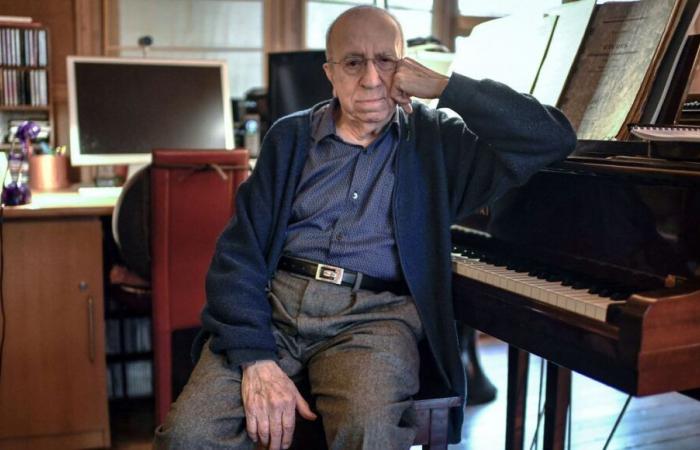He is one of the greatest French jazzmen, composers, pianists, and beyond: a living legend of music. He has played with Sidney Bechet, Oscar Peterson, Django Reinhardt, Stan Getz, Stéphane Grappelli, Lee Konitz and many others! On the occasion of the publication of his autobiography “My century of jazz” by Frémeaux & Associés, we are at Martial Solal’s this morning.
This microphone that we hand him, he knows it well, he who produced, in the early 1990s and under the leadership of Claude Samuel, a weekly broadcast on the airwaves of France Musique, welcoming around a hundred pianists from a new generation of musicians, many of whom claimed the inspiration that Martial Solal represented for them. From this radio adventure was born an album, Martial Solal improvises for France Musiquein 1994, bringing together some of his improvisations during these broadcasts. “It lasted four years, every Sundayhe explains. I praised all my pianists, good or bad. It taught me a lot. We learn a lot by listening to others. I also learned to speak on the microphone, to present myself in public, which was not my cup of tea. I was very shy in my early yearsconfesses the pianist. It took me a lot of failures to get comfortable. In the end, I was very comfortable. For my last concert, I was even amusing, it seems.”
Jazz legends Listen later
Lecture listen 60 min
Jazz legends Listen later
Lecture listen 60 min
Martial Solal's autobiography presents itself as a journey through his memories, precise and vivid, at the heart of an extraordinary musical life. “Every evening, he says, my wife goes to bed at 11 p.m. and I go to bed at 1 a.m.. During these two hours, I think about everything, I dictate it to my phone, it keeps me busy and it makes me discover 1000 things that I didn't write in the book. I could have written 500 pages, I wrote 150.”
The musician opens his text with his hometown, Algiers, where he was born on August 23, 1927. He lived there in the family apartment, facing the sea, and encountered jazz there thanks to Radio Algiers. He particularly remembers one of his first discoveries, the Glenn Miller orchestra, “resolutely modern at the time”he specifies. “He managed to give a different sound to his saxophone sectioncontinues Martial Solal, by putting a clarinet as the first voice. A honeyed sound, higher than the usual saxophones, and I loved it. I noted all its themes and I still know them by heart. They are in my head anyway, not in my fingers. » Then it was at the age of 22 that he moved to Paris. He doesn't know anyone, but will nevertheless very quickly play in the biggest clubs in the capital. Club Saint-Germain is one of them, just two years after his arrival, where he performs notably with Django Reinhardt. “Above all, I had to earn my living, he explains, so I had to play. I was competing with all the other pianists, so I was trying to make progress. I had a certain self-confidence, perhaps an unconsciousness, but I continued without worrying too much about the immediate future. Things went well, I had incredible luck. I'm almost ashamed to have had so many chances, which brought me to the top. »
From jazz clubs to composition
Among these “incredible chances” there is the big screen, for which Martial Solal composes thanks to the meeting of two great directors: Jean-Pierre Melville and Jean-Luc Godard. He will compose, among other things, the music ofOut of breath in 1960. But these opportunities are accompanied by a spirit of audacity and independence, which has never left Martial Solal. This is how he composes his Suite in D flat for jazz quartet, 30 minutes of particularly elaborate music, at a time when jazz musicians, including him, “only played on 32 bar themes”he said. “I was going against everyone, and it was a bit surprising.”
The musician has always embraced this freedom of spirit: he never wanted to be like anyone. “Copying was everything I hated, he says. I had crazy ideas in my head that I couldn't express. But I hoped one day to be able to do it thanks to work, to technique. I didn't buy records. But I knew everything. There is no need to listen to all of Beethoven's Sonatas to know what the Beethovenian universe is.”
MAXXI Classic Listen later
Lecture listen 4 min
Orchestrator for the symphony
Improviser, musician in the greatest groups, daring composer for jazz and cinema, Martial Solal has also composed for the symphony, notably the Radio France orchestras. An important dimension of his career to which the Orchester National de France paid tribute a few years ago by performing several of his Concertos, some of which were played for the first time. “I wanted to cry, remembers Martial Solal. I was very happy. » Because classical music has always accompanied him, from his training to his sources of inspiration for writing, and because it was important for him to bring together two musical worlds which did not mix much. “At the time, there was a difference in mentalities, a form of distancing, says Martial Solal. I absolutely wanted to break these barriers. I wasn't the only one, many jazz musicians wrote for the symphony. But I thought that music was music, and that jazz deserved a better destiny than the one reserved for it. To grow it needed wings, long-lasting works like those of Duke Ellington for example. You had to come out of your shell, and therefore flirt with other worlds of music. Symphonic music is so rich that we could inevitably draw some additional ideas from it.” Works that Martial Solal is particularly keen on, and which today deserve to be transmitted to the public.
The 8 p.m. concert Listen later
Lecture listen 2h 28min
Martial Solal, “My century of jazz”, published by Frémeaux & Associés.






